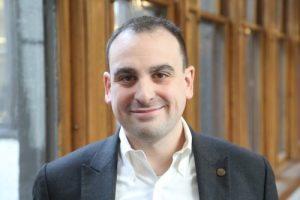Before the Portland inflatable frog, there was the D.C. Sandwich Guy. Sean Dunn, a Department of Justice paralegal, became a symbol of resistance for flinging his Subway sandwich at a Customs and Border Patrol agent, Greg Lairmore, occupying D.C. as part of the Trump administration’s martial law test run. Dunn lost his job with the DOJ, but avoided indictment when the grand jury responded with a no bill issued between fits of laughter. This allowed every lawyer in America to collectively make a crack about being able to indict a ham sandwich as the nation groaned from an overdose of lawyer dad joke energy.
But the Trump administration had piled too much onto this case to let it go — including a bizarre hype video about arresting Dunn as though he was the Zodiac killer and not “guy who threw some bread.” And so they’ve moved forward with a misdemeanor charge.
Because if they thought earning a no bill was an embarrassment, why not test your luck with a 12 Angry D.C. citizens?
In the intervening months, did you take a second to consider what the testimony would sound like in a trial about criminally charging someone for tossing a sandwich? Because you know who didn’t think about that: the Department of Justice. That trial began today — the day after National Sandwich Day, mind you — and the testimony did not disappoint.
A Huffington Post reporter covered the proceedings.
Slow violin music, “My dearest Emily, me and the boys took hell this morning. Sandwiches everywhere. I scarcely believe I can eat mustard again.”
The prosecution has an overarching strategy to litter the proceedings with more deadly sounding jargon. Responding to the motion to dismiss, prosecutors said Dunn was “recorded throwing a sandwich at a federal officer at point-blank range” suggesting sandwiches become especially deadly at some specific distance. In line with this effort to drum up testimony that sounded ominous without being a blatant lie, the trial prep clearly landed on the phrase “kind of exploded” to help dupe jurors into thinking this was an IED in Fallujah and not a $5 footlong on U street.
Shady, but nonetheless competent work. While they were high-fiving over this rhetorical coup, I want to believe Lairmore said, “Oh, I also could smell the onions and mustard… should I tell the jury that?” and the prosecutors shrugged and said, “Sure, knock yourself out.”
If mustard is spicy enough, it can burn. Not like napalm, but… it might clear your sinuses. Does that matter in this case? George Conway weighs in:
If you thought this would mark the end of the embarrassingly stupid testimony, you would be wrong. The defense got an opportunity to cross-examine the witness and tried using a photograph to refresh his recollection.
Or should I say “re-Eat fresh his recollection?” I shouldn’t.
Cue it up…
So much for the chain of custody.
It’s an important line of questioning, because to the extent the prosecution slapped themselves on the back for describing the sandwich as “exploded,” the photographic evidence suggests the Sandwich Artists over at Subway did a much better job than the government would have you believe.
No, that’s superior wrapping and excellent sticky condiment distribution.
Over the objection of the prosecution, the defense also dug into how Lairmore has managed to move on after his brush with flavor. Truly a grim tale of anguish and shock.
That certainly doesn’t sound like an officer suffering from a vicious assault. But PTSD can manifest in different ways. Hopefully, he’s not moving to any small Pacific Northwest towns any time soon. And if he does… let’s just hope it’s a Jimmy John’s town.
Joe Patrice is a senior editor at Above the Law and co-host of Thinking Like A Lawyer. Feel free to email any tips, questions, or comments. Follow him on Twitter or Bluesky if you’re interested in law, politics, and a healthy dose of college sports news. Joe also serves as a Managing Director at RPN Executive Search.
The post ‘I Could Smell The Onions And Mustard,’ The Harrowing Testimony Of The Border Patrol Sandwich Victim appeared first on Above the Law.

